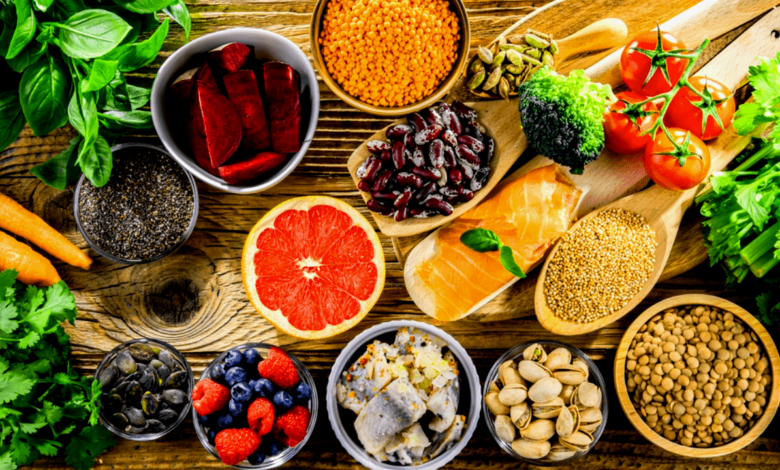Superfoods Demystified: Incorporating Nutrient-Rich Options into Your Diet

In today’s fast-paced world, maintaining a healthy diet can often feel like a daunting task. With so much information available about different foods and their benefits, it’s easy to get overwhelmed. One term that frequently pops up in discussions about nutrition is “Superfoods Demystified .” But what exactly are superfoods, and how can they benefit your health?
Superfoods Demystified
Superfoods are nutrient-dense foods that are exceptionally beneficial for health and well-being. They are typically rich in vitamins, minerals, antioxidants, and other essential nutrients, making them valuable additions to any diet. While there is no official definition of what constitutes a superfood, these foods are often praised for their ability to promote overall health and prevent chronic diseases.
Read More : Unlocking the Secrets to a Balanced and Healthy Lifestyle
Understanding Nutrient-Rich Foods
Definition and Characteristics
Nutrient-rich foods, including superfoods, are those that provide a high concentration of essential nutrients relative to their calorie content. These foods are packed with vitamins, minerals, fiber, and phytochemicals, which are compounds found in plants that have been shown to have health-promoting properties.
Importance in a Balanced Diet
Incorporating nutrient-rich foods into your diet is crucial for maintaining optimal health. These foods can help support a strong immune system, improve digestion, boost energy levels, and reduce the risk of developing chronic diseases such as heart disease, diabetes, and cancer.
Common Superfoods and Their Benefits
Leafy Greens
Leafy greens such as spinach, kale, and Swiss chard are excellent sources of vitamins A, C, and K, as well as folate, iron, and calcium. They are also rich in antioxidants, which help protect cells from damage caused by free radicals.
Berries
Berries like blueberries, strawberries, and raspberries are packed with antioxidants, fiber, and vitamins. They have been linked to improved brain function, reduced inflammation, and a lower risk of heart disease.
Nuts and Seeds
Nuts and seeds, including almonds, walnuts, chia seeds, and flaxseeds, are loaded with healthy fats, protein, fiber, vitamins, and minerals. They can help lower cholesterol levels, regulate blood sugar, and promote satiety.
Whole Grains
Whole grains like quinoa, brown rice, oats, and barley are rich in fiber, B vitamins, and minerals such as magnesium and selenium. They provide sustained energy, support digestive health, and may help reduce the risk of type 2 diabetes and obesity.
Fish
Fatty fish like salmon, mackerel, and sardines are excellent sources of omega-3 fatty acids, which are essential for brain health and heart health. They also provide high-quality protein and various vitamins and minerals.
Legumes
Legumes such as beans, lentils, and chickpeas are nutrient powerhouses, offering protein, fiber, vitamins, and minerals. They can help lower cholesterol, regulate blood sugar, and promote a healthy gut microbiome.
How to Incorporate Superfoods into Your Diet
Incorporating superfoods into your diet doesn’t have to be complicated. Here are some simple tips and ideas to help you get started:
Meal Planning Tips
- Plan Ahead: Take time to plan your meals for the week and include a variety of superfoods in each meal.
- Stock Up: Keep your kitchen stocked with a variety of nutrient-rich foods so that you always have healthy options on hand.
- Experiment: Don’t be afraid to try new recipes and ingredients to keep your meals exciting and flavorful.
Simple Recipes and Ideas
- Smoothie Bowl: Blend together leafy greens, berries, Greek yogurt, and a splash of almond milk for a nutritious and delicious breakfast or snack.
- Quinoa Salad: Toss cooked quinoa with chopped veggies, avocado, and a drizzle of olive oil and lemon juice for a refreshing and satisfying meal.
Snack Options
- Trail Mix: Combine nuts, seeds, dried fruit, and dark chocolate chips for a portable and nutritious snack.
- Hummus and Veggie Sticks: Pair homemade or store-bought hummus with carrot, celery, and cucumber sticks for a satisfying and crunchy snack.
Debunking Myths Surrounding Superfoods
Despite their popularity, superfoods are often subject to myths and misconceptions. Here are a few common myths debunked:
- Superfoods vs. Regular Foods: While superfoods offer concentrated nutritional benefits, they are not necessarily superior to other whole foods. A balanced diet that includes a variety of nutrient-rich foods is key to overall health.
- Marketing Hype vs. Scientific Evidence: Many products are marketed as superfoods demystified without sufficient scientific evidence to support their health claims. It’s essential to evaluate the evidence behind these claims and make informed choices about which foods to incorporate into your diet.
Potential Risks and Considerations
While superfoods can offer numerous health benefits, it’s essential to consider potential risks and limitations:
- Allergies and Sensitivities: Some people may be allergic or sensitive to certain superfoods demystified. It’s important to pay attention to your body’s reactions and consult with a healthcare professional if you have any concerns.
- Moderation and Variety: While superfoods can be beneficial, it’s essential to consume them as part of a balanced diet that includes a variety of nutrient-rich foods. Eating too much of any one food can lead to nutrient imbalances and potential health risks.
Read More : 10 Essential Tips for Maintaining a Healthy Weight
Conclusion: Embracing a Superfood-Rich Diet for Optimal Health
Incorporating nutrient-rich superfoods into your diet is a simple and effective way to promote overall health and well-being. By focusing on whole, minimally processed foods like leafy greens, berries, nuts, seeds, whole grains, fish, and legumes, you can nourish your body with the essential nutrients it needs to thrive. Remember to plan your meals, experiment with new recipes, and enjoy a variety of foods to keep your diet balanced and satisfying.
FAQs (Frequently Asked Questions)
- Are superfoods a magic bullet for health?
While superfoods offer valuable nutrients, they are not a substitute for an overall healthy diet and lifestyle. Incorporating a variety of whole foods is essential for optimal health.
- Can I eat too many superfoods?
While superfoods are nutritious, it’s important to consume them in moderation as part of a balanced diet. Eating too much of any one food can lead to nutrient imbalances.
- Are superfoods expensive?
While some superfoods can be pricey, many are affordable and accessible, especially when purchased in-season or in bulk. Look for budget-friendly options like frozen berries, canned beans, and whole grains.
- Do I need to buy exotic superfoods to reap the benefits?
Not at all! Many everyday foods like spinach, blueberries, oats, and beans are considered superfoods and offer excellent nutritional benefits without breaking the bank.
- Are superfood supplements necessary?
While supplements can be convenient, it’s generally best to get your nutrients from whole foods whenever possible. Whole foods provide a complex matrix of nutrients that supplements may not fully replicate.











